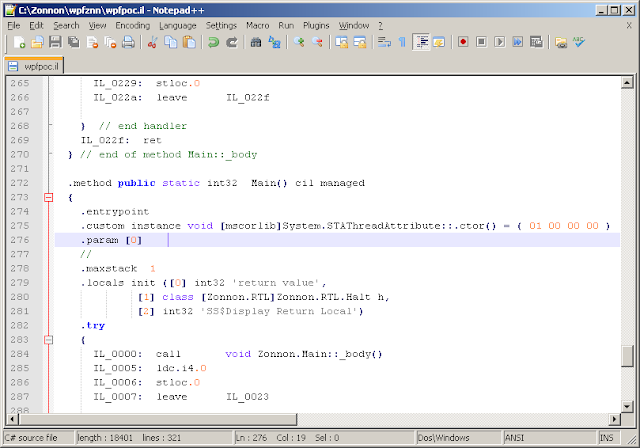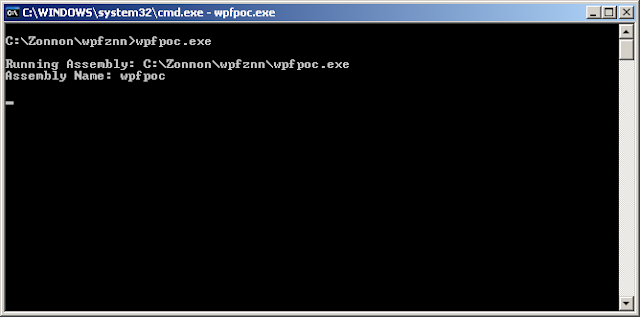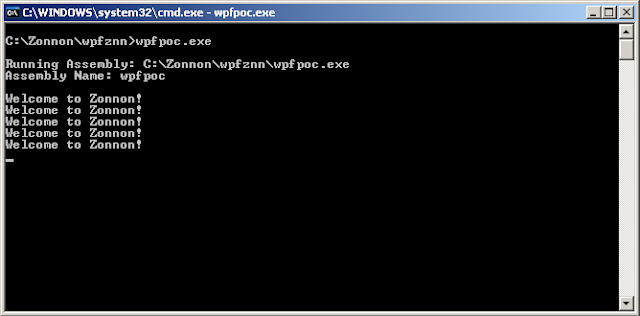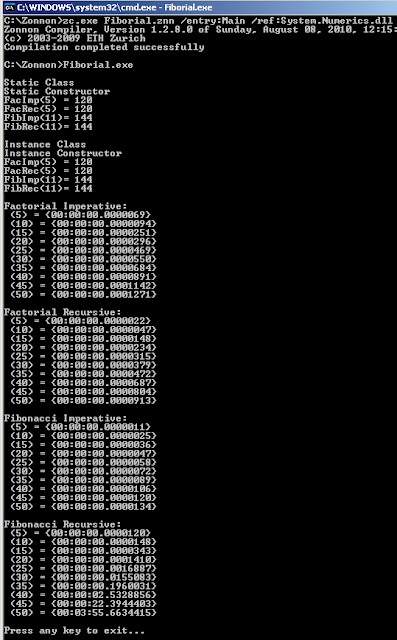Today's post is about Arrays and Indexers in Zonnon. Here below you will find a very easy to follow program, that demonstrate arrays and indexer, by implementing some simple tasks that will make you grasp the idea of those 2 features real quick. The main goal of this post, is not really teaching arrays because, come on, you probably already know "all" about them, in fact, it is more to show you how you do that in Zonnon, in this case, compared to all other 22 languages on future posts, which essentially, is the real aim behind this blog.
By the way, if you missed my most recent post, "New Series - Arrays and Indexers", check it out. It has more details about the following program, and a bunch of definitions for the concepts used on this, and the following, posts. Or you can check my previous posts about arrays in C# and Oxygene just to compare.
I encourage you to copy the code below and try it yourself, normally, all programs you find in this blog are source code complete, just paste it on Zonnon Builder and run it.
Last thing. There is room for improvement of the code, using generics is one example, but Generics, Collections, lambdas, etc. will have their own "series" of posts.
(*****************************************
String Utilities Module
*****************************************)
module Str;
type {private} MArrayOfChar = array {math} * of char;
type {private} ArrayOfChar = array * of char;
type {private} ArrayOfString = array * of string;
procedure {public} CountWords(s: array * of char; sep: char): integer;
var i,slen,wlen,c: integer;
begin
slen := len(s)-1;
c := 0;
for i := 0 to slen do
wlen := 0;
while (i < slen) & (s[i] # sep) do inc(wlen); inc(i); end;
if (i <= slen) & (wlen > 0) then inc(c) end;
end;
return c;
end CountWords;
procedure {public} Split(s: string; sep: char)
: array * of string;
var i,j,k,slen,wlen,pos: integer;
l: array * of char;
a: array * of string;
begin
l := new ArrayOfChar(len(s)+1);
copy(s, l);
slen := len(l)-1;
a := new ArrayOfString(CountWords(l,sep));
pos := 0; k := 0;
for i := 0 to slen do
wlen := 0;
while (i < slen) & (l[i] # sep) do inc(wlen); inc(i); end;
if (i <= slen) & (wlen > 0) then
if (i <= slen) then a[k] := s.Substring(pos,wlen); inc(k) end;
for j := 0 to wlen do inc(pos) end;
end;
end;
return a;
end Split;
procedure {public} Join(c: char; arr: array {math} * of char): string;
var i: integer;
s: string;
begin
s := "";
for i := 0 to len(arr) - 1 do
s := s + string(arr[i]) + string(c);
end;
if len(s) == 0 then return s end;
return s.Substring(0,s.LastIndexOf(c));
end Join;
end Str.
(*****************************************
Alphabet Object
*****************************************)
object {ref} Alphabet(asize: integer; astr: string; achar: array * of char)
implements [];
import Str;
type {private} ArrayOfChar = array * of char;
type {private} ArrayOfString = array * of string;
(* Array Field *)
var {private} letters: array {math} * of char;
(* Indexer Get/Set Property *)
procedure {public} Get(i: integer): char implements [].Get;
begin
return self.letters[i];
end Get;
procedure {public} Set(i: integer; c: char) implements [].Set;
var s: string;
begin
s := string(c);
if ~(s = s.ToUpper()) then s := s.ToUpper(); c := s[0] end;
self.letters[i] := c;
end Set;
(* No Property, Getter instead *)
procedure {public} GetLength: integer;
begin
return len(self.letters);
end GetLength;
(* Override Method *)
procedure {public} ToString: string implements System.Object.ToString;
begin
return Str.Join(char(','), self.letters);
end ToString;
(* Method *)
procedure {public} Slice(start: integer; length: integer)
: array * of char;
var l: integer;
a: array * of char;
begin
a := new ArrayOfChar(len(self.letters));
a := self.letters[start..length-1];
return a;
end Slice;
(* No Overloaded Constructors Support in v 1.3.0 *)
(* Contructor | Initializer *)
begin
if asize # 0 then
self.letters := new ArrayOfChar(asize);
elsif astr # nil then
self.letters := new ArrayOfChar(len(astr));
copy(astr.ToUpper(),self.letters);
elsif achar # nil then
self.letters := achar;
else
self.letters := new ArrayOfChar(0);
end;
end Alphabet.
(*****************************************
Program Module
*****************************************)
module Main;
import System.Random as Random,
Str, Alphabet;
type {private} ArrayOfChar = array * of char;
type {private} ArrayOfString = array * of string;
type {private} ArrayMatrix = array {math} *,* of integer;
type {private} JaggedArrayOfString = array * of array * of string;
procedure ReverseChar(var arr: array * of char)
: array * of char;
var
reversed: array * of char;
i,j: integer;
begin
i := 0;
reversed := new ArrayOfChar(len(arr));
for j := len(arr,0)-1 to 0 by -1 do
reversed[i] := arr[j];
inc(i);
end;
return reversed;
end ReverseChar;
procedure BubbleSortInt(var arr: array {math} * of integer)
: array {math} * of integer;
var i, j, swap: integer;
begin
swap := 0;
for i := len(arr) - 1 to 1 by -1 do
for j := 0 to i - 1 do
if arr[j] > arr[j + 1] then
swap := arr[j];
arr[j] := arr[j + 1];
arr[j + 1] := swap;
end;
end;
end;
return arr;
end BubbleSortInt;
procedure BubbleSortString(var arr: array * of string)
: array * of string;
var
i, j: integer;
swap: string;
begin
swap := "";
for i := len(arr) - 1 to 1 by -1 do
for j := 0 to i - 1 do
if arr[j,0] > arr[j + 1,0] then
swap := arr[j];
arr[j] := arr[j + 1];
arr[j + 1] := swap;
end;
end;
end;
return arr;
end BubbleSortString;
procedure TransposeMatrix(m: array {math} *,* of integer)
: array {math} *,* of integer;
var
i, j: integer;
transposed: array {math} *,* of integer;
begin
(* Transposing a Matrix 2,3
*
* A = [6 4 24]T [ 6 1]
* [1 -9 8] [ 4 -9]
* [24 8]
*)
transposed := new ArrayMatrix(len(m, 1), len(m, 0));
for i := 0 to len(m,0) - 1 do
for j := 0 to len(m,1) - 1 do
transposed[j, i] := m[i, j];
end;
end;
return transposed;
end TransposeMatrix;
procedure UpperCaseRandomArray(arr: array * of array * of string);
var r: Random;
i,j: integer;
s: string;
begin
r := new Random;
i := r.Next(0, len(arr) - 1);
for j := 0 to len(arr[i]) - 1 do
s := arr[i,j];
arr[i,j] := s.ToUpper();
end;
end UpperCaseRandomArray;
procedure PrintArrayChar(var arr: array * of char);
begin
writeln("Print Array Content Char[":0,string(len(arr)):0,"]":0);
for i := 0 to len(arr, 0) - 1 do
writeln(" array [",i:2,"] = ",arr[i]:2," ");
end;
writeln;
end PrintArrayChar;
procedure PrintArrayInt(var arr: array {math} * of integer);
begin
writeln("Print Array Content Int32[":0, string(len(arr)):0, "]":0);
for i := 0 to len(arr, 0) - 1 do
writeln(" array [",i:2,"] = ",arr[i]:2," ");
end;
writeln;
end PrintArrayInt;
procedure PrintArrayString(var arr: array * of string);
begin
writeln("Print Array Content String[":0, string(len(arr)):0, "]":0);
for i := 0 to len(arr, 0) - 1 do
writeln(" array [",i:2,"] = ",arr[i]:2," ");
end;
writeln;
end PrintArrayString;
procedure PrintMatrix(m: array {math} *,* of integer);
var i,j: integer;
begin
writeln("Print Matrix Content Int32[":0, string(len(m,0)):0, ",":0, string(len(m,1)):0, "]":0);
for i := 0 to len(m,0) - 1 do
for j := 0 to len(m,1) - 1 do
writeln(" array [":0,i:2,j:2,"] = ",m[i, j]:2," ":0);
end;
end;
writeln;
end PrintMatrix;
procedure GraphJaggedArray(arr: array * of array * of string);
var lineCount: integer;
i,j: integer;
begin
writeln;
writeln("Print Text Content String[][]":0);
lineCount := 1;
for i := 0 to len(arr) - 1 do
write("Line":0,lineCount:2,"|":0);
for j := 0 to len(arr[i]) - 1 do
write("*":3);
end;
writeln(" (":0,string(len(arr[i])):0,")":0);
inc(lineCount);
end;
writeln;
end GraphJaggedArray;
procedure PrintJaggedArray(arr: array * of array * of string);
var i,j: integer;
line: string;
linearr: array * of string;
begin
writeln;
writeln("Print Jagged Array Content String[][]":0);
for i := 0 to len(arr) - 1 do
line := "";
for j := 0 to len(arr[i]) - 1 do
line := line + " " + arr[i,j];
end;
if line = line.ToUpper() then
line := line + " <-- [UPPERCASED]";
end;
writeln(line:0);
end;
end PrintJaggedArray;
procedure PrintCommonArrayExceptions(arr: array * of array * of string);
(*
"Extra information about the exception can be accessed
by calling the predefined function 'reason'. This causes the
runtime system to return a string which explains the reason
for the exception." Not working in Zonnon version 1.3.0
var s: string;
do ... on exception do
s := reason; <- This gives a "reason not declared" error at compile time.
end;
*)
begin
do
arr[100,100] := 'hola';
on NilReference do
writeln;
writeln("Exception: NilReference":0);
on OutOfRange do
writeln;
writeln("Exception: OutOfRange":0);
on exception do
writeln;
writeln("Exception: Other":0);
on termination do
(* nothing *)
end;
writeln;
end PrintCommonArrayExceptions;
procedure PrintTitle(message: string);
begin
writeln('======================================================':0);
writeln(message:0);
writeln('======================================================':0);
writeln;
end PrintTitle;
var
(*writeln(pos,wlen,Substring(s,pos,wlen),s.Substring(pos,wlen));*)
i: integer;
(* Declare Array of Chars *)
letters: array 5 of char;
inverse_letters: array * of char;
(* Mathematical extensions
Mathematical extensions of Zonnon let use arrays in a more convenient way
for writing applications where multidimensional algebra is used.
Arrays to be used in mathematical extensions should be defined with special
{math} modifier. ArrayType = array "{" math "}" Length {"," Length} of Type.
This option allow you to initialize math array with array expressions,
but it only works for numerical arrays such as
array {math} of integer | real | boolean but not of string.
*)
(* Declare Array of Integers *)
numbers, ordered_numbers: array {math} * of integer;
(* Declare Array of Strings *)
names: array 5 of string;
ordered_names: array * of string;
(* Declare multi-dimensional Array *)
matrix: array {math} 2, 3 of integer;
transposed_matrix: array {math} *,* of integer;
(* Declare Jagged Array *)
text: array * of array * of string;
(* Indexer *)
vowels,en,na: Alphabet;
vs,w: array {math} * of char;
word1,word2,word3: string;
begin
(* Single-dimensional Array(s) *)
PrintTitle("Reverse Array Elements");
(* Initialize Array of Chars *)
letters[0] := 'A';
letters[1] := 'E';
letters[2] := 'I';
letters[3] := 'O';
letters[4] := 'U';
PrintArrayChar(letters);
inverse_letters := ReverseChar(letters);
PrintArrayChar(inverse_letters);
PrintTitle("Sort Integer Array Elements");
(* Initialize Math Array of Integers *)
numbers := [ 10, 8, 3, 1, 5];
PrintArrayInt(numbers);
ordered_numbers := BubbleSortInt(numbers);
PrintArrayInt(ordered_numbers);
PrintTitle("Sort String Array Elements");
(* Initialize Array of Strings *)
names[0] := "Damian";
names[1] := "Rogelio";
names[2] := "Carlos";
names[3] := "Luis";
names[4] := "Daniel";
PrintArrayString(names);
ordered_names := BubbleSortString(names);
PrintArrayString(ordered_names);
(* Multi-dimensional Array (Matrix row,column) *)
PrintTitle("Transpose Matrix");
(* Matrix row=2,col=3
* A = [6 4 24]
* [1 -9 8]
*)
(* Array inline expression used to declare and initialize array *)
matrix := [[6, 4, 24],
[1, -9, 8]];
PrintMatrix(matrix);
transposed_matrix := TransposeMatrix(matrix);
PrintMatrix(transposed_matrix);
(* Jagged Array (Array-of-Arrays) *)
PrintTitle("Upper Case Random Array & Graph Number of Elements");
(*
* Creating an array of System.String arrays using the (System.)String.Split method
*
* Text extract from: 'El ingenioso hidalgo don Quijote de la Mancha'
*
*)
text := new JaggedArrayOfString(8,0);
text[0] := Str.Split("Hoy es el diÂa mas hermoso de nuestra vida, querido Sancho;", ' ');
text[1] := Str.Split("los obstaculos mas grandes, nuestras propias indecisiones;", ' ');
text[2] := Str.Split("nuestro enemigo mas fuerte, miedo al poderoso y nosotros mismos;", ' ');
text[3] := Str.Split("la cosa mas facil, equivocarnos;", ' ');
text[4] := Str.Split("la mas destructiva, la mentira y el egoiÂsmo;", ' ');
text[5] := Str.Split("la peor derrota, el desaliento;", ' ');
text[6] := Str.Split("los defectos mas peligrosos, la soberbia y el rencor;", ' ');
text[7] := Str.Split("las sensaciones mas gratas, la buena conciencia...", ' ');
PrintJaggedArray(text);
UpperCaseRandomArray(text);
PrintJaggedArray(text);
GraphJaggedArray(text);
(* Array Exceptions *)
PrintTitle("Common Array Exceptions");
PrintCommonArrayExceptions(nil);
PrintCommonArrayExceptions(text);
(* Accessing Class Array Elements through Indexer *)
PrintTitle("Alphabets");
vowels := new Alphabet(5,nil,nil);
vowels[0] := char('a');
vowels[1] := char('e');
vowels[2] := char('i');
vowels[3] := char('o');
vowels[4] := char('u');
vs := new ArrayOfChar(5);
vs[0] := vowels[0]; vs[1] := vowels[1];
vs[2] := vowels[2]; vs[3] := vowels[3];
vs[4] := vowels[4];
writeln;
writeln("Vowels = {":0, Str.Join(',', vs):0, "}":0);
en := new Alphabet(0,'abcdefghijklmnopqrstuvwxyz',nil);
writeln("English Alphabet = {":0,en.ToString(),"}":0);
na := new Alphabet(0,nil,en.Slice(9, 19));
writeln("Alphabet Extract en[9..19] = {":0,na.ToString():0,"}":0);
w := new ArrayOfChar(5);
w[0] := en[6]; w[1] := en[14]; w[2] := en[14]; w[3] := en[3];
copy(w, word1);
w := new ArrayOfChar(4);
w[0] := en[1]; w[1] := en[24]; w[2] := en[4];
copy(w, word2);
w := new ArrayOfChar(9);
w[0] := en[4]; w[1] := en[21]; w[2] := en[4]; w[3] := en[17];
w[4] := en[24]; w[5] := en[14]; w[6] := en[13]; w[7] := en[4];
copy(w, word3);
writeln;
writeln(word1:0, " ":0, word2:0, ", ":0, word3:0, "!":0);
writeln;
readln;
end Main.
The output:
Voilà, that's it. Next post in the following days.
























